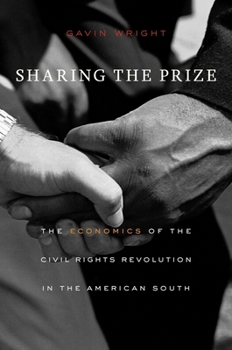Sharing the Prize: The Economics of the Civil Rights Revolution in the American South
Select Format
Select Condition 
Book Overview
Winner of the Alice Hanson Jones Prize, Economic History Association
A Choice Outstanding Academic Title of the Year
--The Economist "Written...with the care and imagination Wright] displayed in his superb work on slavery and the southern economy since the Civil War, this excellent economic history offers the best empirical account to date of the effects the civil rights revolution had on southern labor markets, schools, and other important institutions...With much of the nation persuaded that a post-racial age has begun, Wright's analytical history...takes on fresh urgency."
--Ira Katznelson, New York Review of Books
Format:Paperback
Language:English
ISBN:0674980409
ISBN13:9780674980402
Release Date:February 2018
Publisher:Belknap Press
Length:368 Pages
Weight:0.80 lbs.
Dimensions:0.9" x 5.1" x 7.8"
Customer Reviews
0 rating





